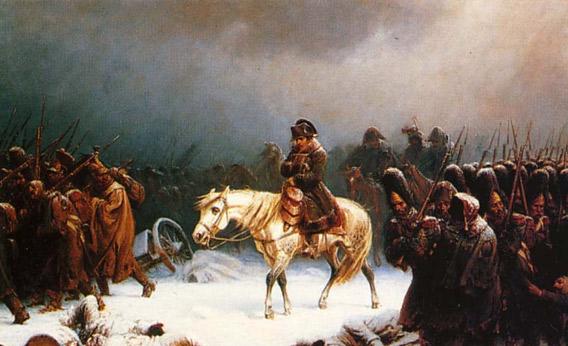 "Napoleon's Retreat from Moscow"
"Napoleon's Retreat from Moscow" Painting by Adolph Northen/Wiki Commons.
History has taught us that Napoleon, in his invasion of Russia in 1812, marched into Moscow with his army largely intact and retreated only because the citizens of Moscow burned three-fourths of the city, depriving the army of food and supplies. The harsh Russian winter then devastated the army as it retreated. The Russians? victory, commemorated by Tchaikovsky?s 1812 Overture, was one of the great upsets of military history.
But no one recognized the truly great power in this war.
In Vilnius, Lithuania, during the winter of 2001, workers were digging trenches for telephone lines and demolishing the old Soviet barracks that had stood for decades. A bulldozer scraped-up something white, so the operator hopped down and, to his surprise, saw the skull and other bones of a human being. Another worker later claimed that ?the things just kept coming out of the ground?there were thousands of them.? Eight years earlier, a grave had been found with the remains of 700 people killed by the Soviet Committee for State Security, commonly known as the KGB. Could this be one of those secret places where the KGB disposed of its victims? Or could it be one the mass burials of Jews murdered by the Nazis?
When archeologists from the University of Vilnius arrived, they found that the bodies were stacked three deep in V-shaped trenches that were apparently dug as defensive positions. It appeared that the skeletons were the remains of soldiers. Two thousand skeletons were excavated, along with belt buckles with regimental numbers on them. Along with the finds were 20-franc coins dating from the early 1800s. It finally dawned on the scientists what they had found: the remains of Napoleon?s Grande Arm?e. Napoleon had led 600,000 men into Russia with the intent of conquering the country;of these, only about 30,000 survived, and of that number, it is said that fewer than 1,000 were ever able to return to duty.
What incredible circumstances could have caused the defeat of one of the greatest armies on the European continent, led by one of the greatest generals of all time? Surprisingly, it wasn?t enemy soldiers or the normal privations soldiers experience that devastated Napoleon?s army. Most of his soldiers were battle-hardened young men, so they should have been able to tolerate the cold, hunger, long marches, and fatigue. No, it was a microscopic organism that wreaked havoc and annihilated Napoleon?s army and his grand plans for conquest. A microbe called typhus, spread by a scourge of lice.
Napoleon initially had no real reason to invade Russia. During the Battle of Friedland in June of 1807, Napoleon?s army defeated the Russian army, and on July 7, 1807, France and Alexander I of Russia signed the Treaties of Tilsit, which made the two countries allies (and, among other things, prohibited Russia from doing business with Britain). Surprisingly, Napoleon did not take any land from Russia or request war reparations. By early 1812, Napoleon controlled most of the land between Spain and Russia. However, England controlled the seas, and Napoleon wanted India, which was then an English colony. Napoleon?s only hope of taking India was to take it by land, which meant controlling Russia.
Since the Treaty of Tilsit, France and Russia had been tense allies. Russia had been violating the treaty by trading with England, and Napoleon, finally fed up, used this as an excuse to invade Russia. In June, 1812, Napoleon?s army assembled in eastern Germany. With magnificent fanfare, Napoleon reviewed his troops on the west bank of the Niemen River on June 22, 1812. Napoleon?s engineers built a pontoon bridge over the river and the army entered Russian-controlled Poland the next day. Things were going well?the summer, though hot and dry, made marching over the roads easy. The supply columns stayed slightly ahead of the soldiers, so food was readily available, and the soldiers were in good health. Though military hospitals were established along the route to Poland in Magdeburg, Erfurt, Posen, and Berlin, there was little need for their services. The army reached Vilnius in four days, meeting no resistance from Russian troops.
Poland is where things started going badly for Napoleon. He found the region filthy beyond belief. The peasants were unwashed, with matted hair and ridden with lice and fleas, and the wells were fouled. Since the army was now in enemy territory, the supply trains had to move to the rear. The roads were soft with loose dust or were deeply rutted from the spring rains; the supply trains lagged farther and farther behind the main body of soldiers, and it became difficult to provide food and water. The army was so huge that it was nearly impossible to keep military formation intact, and the greater part of the army dissolved into straggling, sprawling mobs. Many of the soldiers pillaged the homes, livestock, and fields of the local peasants. Nearly 20,000 army horses died from lack of water and fodder on the way to Vilnius. The homes of the peasants were so filthy that they seemed to be alive with cockroaches. The typical battlefield diseases of dysentery and other intestinal diseases began to appear, and though new hospitals were set up in Danzig, K?nigsberg, and Thorn, they were unable to deal with the large numbers of sick soldiers sent back to the rear.
But Napoleon?s problems were just beginning.
Like Emily Yoffe's Dear Prudence Column on Facebook:
Source: http://feeds.slate.com/click.phdo?i=c322b20ffeb6647d592bf3d2408fc47a
bloom box fat tuesday obama sweet home chicago accenture match play george washington carver king cake mardi gras
No comments:
Post a Comment